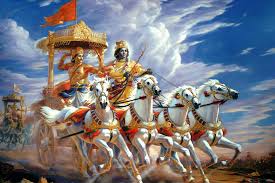GITA AND ITS INSPIRATION FOR TODAY
Dr. Madhu parashar
(Principal)
Shanti Niketan College
Of Business Management
And Computer Science,
Agra.
ABSTRACT
This research paper highlights the universal application of Gita to human life by saying that “It is not the story of some people that lived some time ago but a characterisation of all people that may live at any time in the history of the worlds”. The Gita preaches to see the existence of God in every living being and to do one’s duty.
Shri Madbhagwata Gita or Gita is a form of vedic culture and an epitome of all ours. In this book we find a clean exposition of various Yogas. In yogas the relationship between living creatures and God has been clearly explained. Three forms of Yagas (Karam, Bhakti and Gyan) have defined in Gita. It can be said that Gita incorporates all the scriptures. Because of limitless ideas and feelings, the commentators have propounded different ‘isms’ and ideas. Shankaracharya has supported Gyanyoga’ in his commentary on Gita. Ramanujacharya advoeats ‘Bhaktiyoga’ of the Gita. For Lokmanya Tilak mainly to ‘Karmayoga.’
SEARCH OF BASIC ELEMENTS OF LIFE
In present we do not live in vacuum but in a vivid environment which is full of complexities. There is a constant action and reaction between us and the environment. The elements of intellect are included in the nature of man. This changes the situation. Because of intellect, man is not bound to adopt a definite course and have the ability to choose any one among the several alternatives before him. The ability to choose creates complicated problems too. Owing to this, the need for deciding a policy also arises. So the search of basic elements of life is an attempt to solve such problematic questions.
BACKGROUND
The Gita begins before the climaxtic Kurukshetra war, where the Pandava prince Arjuna is filled with doubt, realizing that his enemies are his own relatives, beloved friends and revered teachers, he turns to his charioteer and the guide, Krishna for advice. Responding Arjuna’s confusion and moral dilemma, Krishna explains to Arjuna his duties as a warrior and a Prince.
THEMES
In beginning of Gita, Kurukshetra has been named as ‘Dharmkshetra’. Not the conflict was between ‘blood relationship’ and ‘Dharam’. Moral view point was that one’s duty (Swadharm) should not be ignored. When there something is ethical, alternatives may be several. Arjuna says to Lord Krishna, “What is the use of a kingdom which is acquired after killing so many of relatives. Lord Krishna says, ‘Oh’ Arjuna you say that so many of your relatives will be killed, but the fact is that you, I and others existed even before this birth and will exist even after. This life of their is over “He who thinks that he can kill the soul and he who thinks that the soul can die, both are ignorant. The soul neither kills nor can ever be killed.”
“To run away from the battle field is not honourable. Battle is your aim of life. If a warrior dies doing his duty, doors of heaven are open for him. So there is nothing better than war (Dharamyuddh) for a Kshatriaya.”
“Your logic of not fighting will deprive you of heaven. If you do not fight; you will lose fame. All will condemn you and will say, being afraid you ran away from the battle field.”
The essence of Lord Krishna’s arguments that if Dharma or duty pulls you in one direction and other inducement in other, you should do your duty (Swadharma) in every situation. A person should be indifferent to attachment (Raag) and consequence (reward or result). Work should be done as a duty regardless of reward or loss.
The famous philosopher Kant of Germany has also accepted this view point of Geeta, and said that while doing one’s duty, a person should be indifferent to the consequent benefit or loss.
IGNORANED TO WORLDLY ATTACHMENTS
When the attachment is strong, it is not momentary. Then this is called worldly allurements. Worldly allurements are of five types- lust (Kama), anger (krodha), greed (Lobha), delusion (Moha) and pride (Ahankar). The first three (lust, anger and greed) are said to be the door to hell. Lust has been described as blind because in lust a person fails to see pros and cons of anything. Anger is aroused when some desire is not fulfilled. In greed, intellect being weak, it becomes the slave of attachment and does not help in achieving that aim. So greed is the main cause of conflict in life. The spare of greed is far more extensive that of lust or anger.
A thing liked by one may not be liked by another. When we feel attachment to something it comes in our consciousness and slowly we become sensitive about it. When our desire is not fulfilled, we become angry. When we are angry we are devoid of all sense and we are unable to see the thing in its right perspective. “Any object that we see is not in a vacuum. It is surrounded by other things which have their effect continuously on it. Such action and reaction is a part of its existence. When Arjun presented difficulties before Lord Krishna, he had in his mind different aspects of the situation. He was constantly thinking of blood-relations, attachment to Bhishma and his reverence for his Guru Dronacharya. Then his mind was active. He knew that when he was engaged in the battle field, he would forget all those relations. In anger one forgets his past and is not worried about the future. When such a situation comes, the mind ceases to work and it comes to stand on the edge of downfall.
RELEVANCE OF GEETA DARSHAN True Meaning of Education: We can know true meaning of education by understanding the virtuous knowledge as propounded by lord Krishna. Virtuous knowledge is that by which we feel unity is diversity and see the abode of God in every creature. Thus according to philosophy of Geeta we can say that true education is that which enables us to see the existence of God in the soul of each living being. In the beginning of war Arjun was confused. Lord Krishna showed the whole universes one person, i.e. in himself as Brahma. Thus he explained to Arjun that he cannot kill any soul because it resides in the Brahma (God) himself.
Ideals Of Education:- Ideals of educations according to Gita can be understood in six parts-
Development Of virtuous knowledge- We and all our students are ignorant of virtuous knowledge. In the Gita Arjun’s ignorance is removed by Lord Krishna and was induced to do his duty. So we can say that ideal or aim of education should be to remove ignorance and impart virtuous knowledge.
Refinement of Evils- Every man’s personality includes good and evil attributes. In other words, Kauravas and Pandavas dwell in every person. Lord Krishna awakens the virtuous power and inspires him to pursue the right path. A teacher’s duty is that he should awaken the virtuous powers of students and inspire them to pursue right path. Thus the aim of education should be the refinements of evils in one’s personality.
Development of inner- consciousness – Arjun does not want to fight. Krishna does not want to compel him to fight against his will. So he takes recourse to reasoning and makes him conscious of his duty. (Swadharma) consequently, Arjun as a result becomes ready to fight his opponents. Thus Lord Krishna, as a guru and a succeed in awakening the inner consciousness of Arjun. In this same a teacher should follow this procedure in developing inner -consciousness in his pupils.
Development Of Intellect, Skill And Reasoning:- Arjun’s doubt for the utility of the battle, is the origin of the teachings of Geeta. Lord Krishna uses the ability of his intellect, skill and reasoning in removing the doubts of Arjun. So that he might take his own decision in choosing the best alternative.
Harmony Between Individual Ind Social Aim:- In battle field Arjun is on the horns of a dilemma regarding his individual freedom and social responsibility. His individual freedom lay in his decision to fight or not to fight. But his social responsibility demanded that for establishment of peace he should take part in the battle in order to punish the evil –doers. Lord Krishna induces him to take up his Gandiv (bow) for killing the evil-doers and their associates. Thus aim of education should be to bring harmony between individual and social aim.
The importance of doing one’s duty (swadharma):- A person can be happy only by establishing a balance between his rights and duties. Lord Krishna tells Arjun that there is nothing better than to do one’s duty. So it is important to emphasise such an attitude before our student’s to-day. We can bring heaven on earth if our students adopt such an attitude in life.
MORAL OF GEETA DARSHAN
In Geeta it can be said that much emphasis has been given on performing one’s duty (swadharma) for the fulfilment of duty Arjun resolves to fight in the battle field. By following this ideal, a man can reach the peak of development and can be free from worldly attachment. The feeling of performing duties should be in the youths of today.
Selected Bibliography
Chaube, S.P. Shiksha ke Samajshastriya adhar, Vinod Pustak Mandir, Agra. 1976
Mathur, S.S. A sociological Approach to Indian Education
Mishra, Umesh. Bhartiya Darshan, Hindi Samiti, Lucknow.
Radha krishan, S. Indian Philosophy
Upadhyaya, B. Bhartiya Darshan.
Weber, Christian O. Basic Philosophies of education
(Holt, Rinehart and Winston, Inc New York, 1960)
Powered by Froala Editor




LEAVE A REPLY